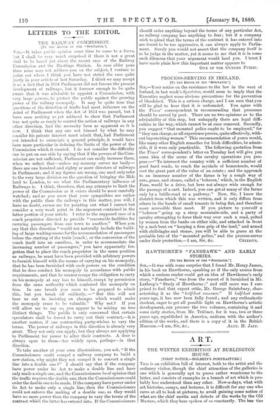LETTERS TO THE EDITOR.
THE RAILWAY COMMISSION.
[TO THE EDITOR OF THE "SPECTATOR."]
takes public opinion some time to come to a focus, but I shall he very much surprised if there is not a great deal to be heard yet about the recent case of the Railway Commission and the Hastings Station. In case abler pens than mine may not address you on the subject, I venture to point out where I think you have not stated the case quite justly in your article of last Saturday. I think we may accept it as a fact that in 1854 Parliament did not foresee the present development of railways, but it foresaw enough to be quite aware that it was advisable to appoint a Commission, with very large powers, to protect the public against the growing power of the railway monopoly. It may be quite true that questions of the direction of traffic had most influence on the mind of Parliament when the Act of 1854 was passed, but I have seen nothing as yet adduced to show that Parliament was not quite as ready to control the action of railways in any other direction, had the necessity been as apparent as it is now. I think that any one not biassed by what he may consider his private interest must admit that, had Parliament not intended to enunciate a general principle, it would have been more particular in defining the limits of the power of the Commission which it created. I do not consider the difficulty can be put on one side by saying that if the powers of the Com- mission are not sufficient, Parliament can easily increase them, when we reflect that—unless my memory serves me badly— there are one hundred and eighty or more directors of railways in Parliament; and if my figures are wrong, one need only refer to the very large division on the question of bringing the Mid- land to London, to see what the Parliamentary influence of Railways is. I think, therefore, that any attempts to limit the power of the Commission as it exists should be most carefully watched ; and as you avow that your sympathies are rather with the public than the railways in this matter, you will, I have no doubt, excuse me for pointing out what I cannot but consider a very weak point in the argument contained in the latter portion of your article. I refer to the supposed case of a coach proprietor directed to provide " reasonable facilities for carrying passengers from one town to another." When you say that this direction " would not naturally include the build- ing of large waiting-rooms for the accommodation of passengers before the starting of the train [coach], or the conversion of the coach itself into an omnibus, in order to accommodate the increasing number of passengers," you have apparently for- gotten that to place the coach proprietor in the same position as railways, he must have been provided with arbitrary powers to furnish himself with the means of carrying on his monopoly, that he has been furnished with such powers on the condition that he does conduct his monopoly in accordance with public requirements, and that he cannot escape the obligation to carry on his monopoly at any loss to himself, except by permission from the same authority which conferred the monopoly on him. In one breath you seem to be prepared to admit this, but you break off suddenly, —" But this will not bear us out in insisting on changes which would make the monopoly cease to be valuable." Why not ? If you will allow me to say so, you appear to be mixing up two distinct things. The public is only concerned that certain speculators shall be forced to carry out their contract,—it is another matter, if one contracting party-wishes to vary the terms. The power of railways in this direction is already very great. They not only can apply, but they always are applying to Parliament for power to alter their contracts. A door is always open to them—too widely open, perhaps—in that direction.
To take another of your own illustrations, you ask, " If the Commissioners could compel a railway company to build a new station, why might they not compel it to convert a single line into a double one ?" I should say that if the company have power under its Act to make a double line and have only made a single one, and the Commissioners be of opinion that the traffic requires the double one, then the Commissioners could order the double one to be made. If the company have power under its Act to make only a single line, then the Commissioners could not enforce the making of a double one, as they would have no more power than the company to vary the terms of the contract which the latter has entered into. If the Commissioners should order anything beyond the terms of any particular Act, no railway company has anything to fear; but if a company wish to plead that the terms of the contract it has entered into are found to be too oppressive, it can always apply to Parlia- ment. Surely you would not assert that the company itself is to be judge in the matter, yet it seems to me that it is in some such dilemma that your argument would land you. I trust I have made plain how this important matter appears to ONE OF THE OUTSIDE PUBLIC.


































 Previous page
Previous page